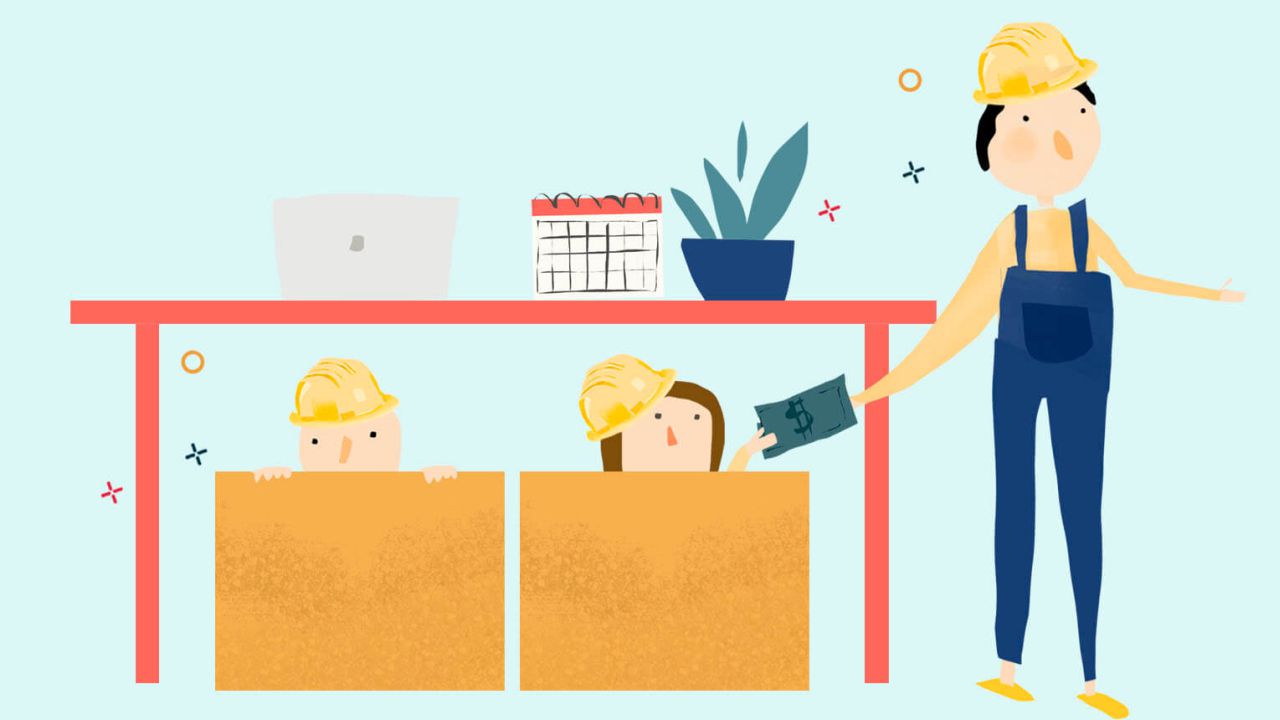Uncovering Risks of Working Under the Table
Explore the dangers of under-the-table work and how to protect your rights and benefits.

Imagine you did a chore, and instead of a grown-up giving you a receipt or paperwork, they handed you money in secret. That’s what it’s like when someone is “working under the table.”
Grown-ups sometimes get paid in cash for jobs without telling the government. But here’s the thing: it’s not allowed. These secret payments mean no taxes are paid, and that’s against the law.
So, while it might seem fun to get quick cash without waiting, it causes big problems for both the person doing the job and the person paying them. You might be wondering, “Why is it such a big deal?” Well, let’s break it down and explore the different parts of this story.
Why Do People Work Under the Table?
Sometimes, grown-ups might want to earn some quick money without any paperwork. It could be because they need money fast or they can’t find another job. Bosses, might not want to pay extra fees to the government, so they try to save money by paying secretly in cash. This way, they don’t have to pay taxes or follow all the work rules.
However, working under the table isn’t as simple as it sounds. Sure, you get money right away, but there are a lot of bad things that can happen, which we’ll get into next.
What Are the Rules?
In most places, grown-ups need to tell the government how much they earn, so they can pay taxes. Taxes are what help pay for things like schools, hospitals, and parks. When someone doesn’t tell the government how much they’re making, it’s like skipping a turn in a game—it’s not fair to everyone else.
There are also rules about how much someone should get paid and what benefits they should receive. These are meant to make sure everyone gets treated fairly at work.
The Big Risks of Working Under the Table
Now, let’s talk about why working under the table is a bad idea, even if it seems cool at first.
You Can Get Into Big Trouble!
Getting paid in secret can lead to serious problems. If someone finds out, the grown-up doing the work and the boss could both get into trouble with the law. The government can make them pay extra money or even send them to jail!
Imagine if you broke the rules in a game—there are always consequences, right? In real life, the consequences can be even bigger, like being fined lots of money or going to court.
No Extra Benefits
When grown-ups work legally, they get special benefits like health insurance, which helps if they get sick. They also get help if they lose their job. If someone is working under the table, they lose out on these protections. It’s like playing a game without any bonus rounds—you don’t get the extra rewards.
Hard to Prove You Have a Job
If you work under the table, there’s no official record that says you even did the job. This can make it tough for a grown-up to get a loan from a bank, rent a house, or even travel to another country.
Let’s say you did an amazing job on a school project, but your teacher didn’t write it down. Later, no one will know how well you did, and that’s frustrating. It’s the same for grown-ups who work under the table—no proof means no credit for their hard work.
What Should You Do Instead?
If someone asks you to work under the table, it’s a good idea to say “no.” Even though it might be tempting, it’s safer to do things the right way. Here’s what a grown-up can do if they’re asked to work secretly:
Know the Rules
Grown-ups need to learn about their rights when it comes to work. By understanding the rules, they can protect themselves from unfair bosses and shady deals.
Keep a Record
Even if they get paid in cash, keeping a record of how much they earned and when they worked is important. It’s like writing down the chores you did so you can show your parents later. Grown-ups need to write down their work hours to make sure they get paid fairly.
Talk to the Boss
If something feels off, it’s always good to talk to the boss. Grown-ups can ask for proper payment with a record of what they did. This way, they can stay safe and avoid trouble later on.
Ask a Lawyer for Help
Sometimes, a grown-up might need to ask a lawyer for help if they feel something is wrong. A lawyer can explain the rules and tell them what to do. Lawyers are like referees in a game—they make sure everyone follows the rules.
What Happens to the Boss?
Bosses who pay workers under the table can get into serious trouble. First, they might have to pay huge fines. It’s like when you break the rules in a game and have to give back your extra tokens. The government makes them pay back money for not following the law. This can cost a lot and hurt the boss’s business.
In some cases, bosses can even go to jail for paying workers illegally. This is a very serious punishment, like a grown-up version of a time-out, but it lasts much longer. Going to jail can also ruin their reputation and make it hard for them to run a business again.
Finally, workers who aren’t treated fairly can report their bosses to the government. If the government finds out, the boss might have to pay the workers what they owe, plus extra money for breaking the law. This can make it tough for the boss and could lead to even more problems with other workers and the law.
What Should Workers Do if They Are Paid Under the Table?
If someone is getting paid under the table, the first step to fix the problem is to talk to the boss. The worker can ask to be paid properly with all the necessary paperwork. While it might feel scary to bring up, this direct conversation could be the easiest way to solve the issue and make sure everything is done legally.
If the boss doesn’t agree to pay legally, the worker should start keeping a personal record of their work. This is like keeping a secret diary of all the hours worked, payments received, and any other important details. Having this information will be useful later if the worker needs to prove what happened.
Finally, if the boss still refuses to do things the right way, the worker can report the situation to the authorities. This is like telling a teacher when someone breaks the rules. By reporting to the government, the worker can help stop the illegal behavior and protect both themselves and others who might be in the same situation.
Read Also: 8 Ways to Legally Protect Your Online Business
How Can Lawyers Help?
Lawyers are like superheroes for adults, stepping in to help when someone is treated unfairly. If a worker is being paid under the table, a lawyer can offer valuable advice. They explain the worker’s rights and guide them on what steps to take, making sure the worker understands how to handle the situation.
If the issue becomes serious, a lawyer can take the case to court. This is similar to calling in a referee to make sure the rules are followed. In court, the lawyer fights for the workers, ensuring they get fair treatment and any money owed to them. The lawyer’s support can make a big difference in winning the case.
Sometimes, bosses might try to punish workers for speaking up, but a lawyer can step in to stop this from happening. If a worker faces threats or risks losing their job for doing the right thing, the lawyer can protect them. This way, workers can stand up for themselves without fear of being retaliated against by their employers.
Read Also: Why Entrust Your Bussiness to a Los Angeles Bussiness Lawyer
What If the Worker Doesn’t Report It?
Some workers may feel too scared to report their boss or worry about getting into trouble. However, staying silent can lead to even bigger issues in the future.
For instance, when adults work legally, they enjoy benefits like health insurance and support if they lose their jobs. If they don’t speak up about under-the-table work, they miss out on these vital protections, which can leave them vulnerable in tough situations.
Additionally, avoiding the issue doesn’t guarantee safety. Even if a worker chooses not to report their boss, there’s still a chance that the government could discover the illegal payment arrangement.
If that happens, the worker may face legal consequences for not paying taxes on their earnings. This situation could lead to fines or other penalties, highlighting the importance of being honest from the start.
Ultimately, taking action can help protect workers in the long run. Reporting under-the-table work may seem daunting, but it is crucial for securing the benefits and legal protections they deserve.
By speaking up, workers can avoid the fear of potential future problems and ensure they are treated fairly in the workplace. It’s essential to remember that honesty is always the best policy, especially when it comes to employment and financial matters.
Conclusion: Follow the Rules for a Better Future
Even though working under the table might seem like a quick way to make money, it’s full of risks and can lead to serious problems. From losing out on benefits to getting into legal trouble, the risks are just too big.
By following the rules, grown-ups can protect themselves and make sure they’re treated fairly. It’s important to know your rights, talk to your boss, and get help if needed. When everyone follows the rules, the work world becomes a better, safer place for all.
Remember, honesty is always the best policy, whether you’re at work, school, or anywhere else!






